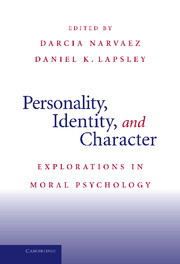Book contents
- Frontmatter
- Contents
- Contributors
- Introduction
- 1 The Moral Personality
- 2 The Moral Functioning of the Person as a Whole: On Moral Psychology and Personality Science
- 3 Moral Science? Still Metaphysical After All These Years
- 4 Cultural Pluralism and Moral Identity
- 5 Neuroscience and Morality: Moral Judgments, Sentiments, and Values
- 6 Triune Ethics Theory and Moral Personality
- 7 Early Foundations: Conscience and the Development of Moral Character
- 8 The Development of the Moral Personality
- 9 Urban Neighborhoods as Contexts for Moral Identity Development
- 10 Moral Personality Exemplified
- 11 Greatest of the Virtues? Gratitude and the Grateful Personality
- 12 The Elusive Altruist: The Psychological Study of the Altruistic Personality
- 13 Growing Toward Care: A Narrative Approach to Prosocial Moral Identity and Generativity of Personality in Emerging Adulthood
- 14 Moral Identity, Integrity, and Personal Responsibility
- 15 The Dynamic Moral Self: A Social Psychological Perspective
- 16 The Double-Edged Sword of a Moral State of Mind
- 17 Moral Identity in Business Situations: A Social-Cognitive Framework for Understanding Moral Functioning
- 18 The Moral Functioning of Mature Adults and the Possibility of Fair Moral Reasoning
- 19 Moral Personality: Themes, Questions, Futures
- Author Index
- Subject Index
7 - Early Foundations: Conscience and the Development of Moral Character
Published online by Cambridge University Press: 05 June 2012
- Frontmatter
- Contents
- Contributors
- Introduction
- 1 The Moral Personality
- 2 The Moral Functioning of the Person as a Whole: On Moral Psychology and Personality Science
- 3 Moral Science? Still Metaphysical After All These Years
- 4 Cultural Pluralism and Moral Identity
- 5 Neuroscience and Morality: Moral Judgments, Sentiments, and Values
- 6 Triune Ethics Theory and Moral Personality
- 7 Early Foundations: Conscience and the Development of Moral Character
- 8 The Development of the Moral Personality
- 9 Urban Neighborhoods as Contexts for Moral Identity Development
- 10 Moral Personality Exemplified
- 11 Greatest of the Virtues? Gratitude and the Grateful Personality
- 12 The Elusive Altruist: The Psychological Study of the Altruistic Personality
- 13 Growing Toward Care: A Narrative Approach to Prosocial Moral Identity and Generativity of Personality in Emerging Adulthood
- 14 Moral Identity, Integrity, and Personal Responsibility
- 15 The Dynamic Moral Self: A Social Psychological Perspective
- 16 The Double-Edged Sword of a Moral State of Mind
- 17 Moral Identity in Business Situations: A Social-Cognitive Framework for Understanding Moral Functioning
- 18 The Moral Functioning of Mature Adults and the Possibility of Fair Moral Reasoning
- 19 Moral Personality: Themes, Questions, Futures
- Author Index
- Subject Index
Summary
The themes of moral self, identity, and character underscore the complex foundations of mature moral conduct. Adults act from a sense of self in which moral integrity may be an important component. They respond to everyday ethical challenges by enlisting identities – professional, familial, religious – that provide guidance. Adults are also integrated into networks of social relationships that motivate moral conduct, in communities that may either support or undermine acting on the basis of moral character. It is not surprising that the influences on moral self, identity, and character have inspired centuries of philosophical reflection on the nature of human conduct and, more recently, nearly a century of intensive psychological study. The themes of this volume are genuinely a lifespan developmental concern.
Well … almost lifespan. This is because despite concerted interest in the origins of moral character in childhood, adolescence, and adulthood, developmental influences in infancy and early childhood have been long neglected. Moral development in classic theories describes how the child abandons the egocentric, authoritarian orientation of the early years in favor of a more mature, humanistic orientation. As a consequence, researchers have naturally been more interested in the developmental influences and transitions of middle childhood and beyond. The purpose of this chapter is to argue, however, that the time is long overdue for a reconsideration of the foundations of moral character in early childhood.
- Type
- Chapter
- Information
- Personality, Identity, and CharacterExplorations in Moral Psychology, pp. 159 - 184Publisher: Cambridge University PressPrint publication year: 2009
- 11
- Cited by

